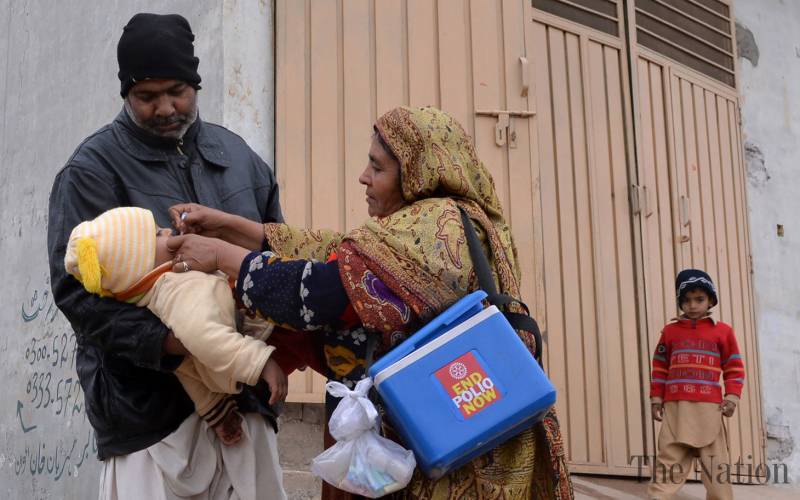This week’s piece was inspired by the sight of two men and a woman on a road in rural Islamabad. The woman had a ‘polio team’ box slung over her shoulder, while the middle aged man was carrying some papers. It was however, the third person in this team, who caught my attention. Clad in the blue uniform of the Islamabad Police, he was riding a motorcycle alongside his colleagues. With the temperature hovering around forty degrees centigrade and the sun blazing down upon them, the woman’s face was streaked with sweat, while her companion’s shirt was showing an expanding stain of perspiration. I could also detect signs of fatigue, since the pair was trudging from house to house on an ascending and descending route. In contrast, the policeman looked fresh and ‘cool’ sitting astride his motorbike.
Unable to contain the urge that wells up inside me on such occasions, I asked the cop if he had been assigned to protect his companions. On hearing a reply in the affirmative, I told him that he would be unable to do so, since he was handicapped by his ‘bike’ and the time he would take to react and get his weapon (which was nowhere in sight). I also asked him if it was right for him to ride a vehicle, while a lady and a middle aged man were carrying out their duties diligently on foot. Two beady eyes glared at me from under the ‘baseball’ type cap as I heard the words, “Apna kaam karain uncle”. These did not come as a surprise since, I have been on the receiving end of this phrase for quite a few years.
The sight of a cop on duty, with his slept-in uniform, the cap pushed back to expose a mop of oily hair and non-regulation footwear – all combine to stereotype our custodians of law and order. I once watched the arrival of a small contingent of blue clad cops at a new checkpoint on Murree Road, while waiting to pick up a few guests, who needed guidance to my home. I was amused to no end, when the fat-bellied Head Constable in charge of the group, ordered one of his subordinates (probably a newly passed out recruit) to go fetch him a chair. The cherished object was produced as if by magic and I left the spot with the receding image of the ‘picket commander’ lolling luxuriously on duty, legs spread apart – a befitting role model for his team.
The other day, I was sitting in the office of the Islamabad Police, when I mentioned that the convergence of vehicles on the single lane of a security check point presented a lucrative target for mischief. I then asked as to why did the police at the checkpoints allow impatient drivers break the lines and pass through barriers out of turn. I was amused when the person I was talking to showed his surprise that this was being done. I left behind an irate cop, who must have put me down as an eccentric troublemaker, when as a parting shot I said that if only he or his superiors would take the trouble to get out of their air conditioned offices and spend some random minutes at these checkpoints, they would understand my concern.
The Punjab Police is strutting about in brand new uniforms, amidst a lot of fanfare. For me this so called ‘reform’ only reinforces the notion of a provincial administration that is bereft of wisdom, for what is a change of uniform, when the one who wears it, remains unchanged. Conditions within our civilian ‘arm of the law’ have reached almost irreparable proportions requiring surgical steps. ‘Stuffed’ with corrupt, inept and politically linked manpower, our police needs to be subjected to a massive ‘combing’ operation and restructuring, so designed as to render it safe from political manipulation. Perhaps, one way of doing this is to put it under command of the army. This articulation has been done with good results in some Latin American countries.
There was once an old man with his head full of conventional wisdom. It was he, who said that the best way to heal a sick society was to have effective law enforcement. It appears that what he said is applicable to our prevailing conditions – urgently and without mercy. The question is, who will carry out this enforcement? If we expect it to be done by our existing police, we are sadly mistaken.






